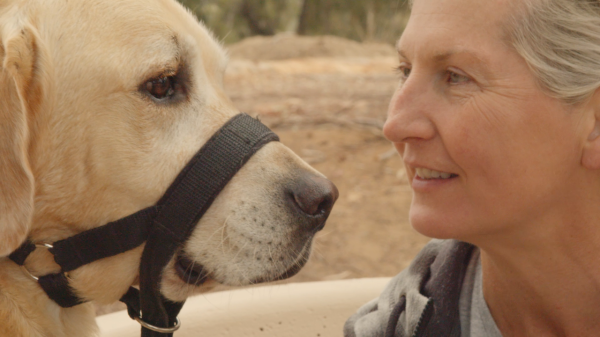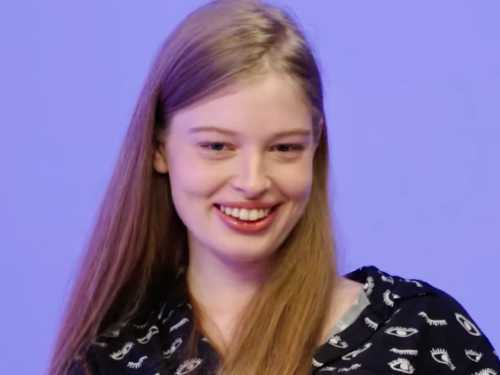
The director takes as his subject Lorilei Lebruska and also her service dog, Orbit, following them as they move in tandem through the world.
When you’re out in public with a service dog, “you feel like you’re walking around with a glittery unicorn,” Lorilei Lebruska said. Everywhere she goes with Orbit, her golden retriever-Labrador mix, someone stops her to ask questions. What’s your dog’s name? Can I pet your dog? Sometimes they get too personal; other times, they share their own sorrows and struggles.
In the opening scenes of “Thank You for Your Service,” a short film directed by Nic Kuklinski, shots of Orbit snoozing with a plush lamb are juxtaposed with footage from the first Gulf War, in which Lebruska served as an Army linguist and translator during Operation Desert Shield and Operation Desert Storm. There’s George H. W. Bush, artillery fire, smoke—then yellow fur, the wheeze of a scrunched nose. At home, in California, Lebruska pages through photos from her time in Kuwait.
“When I returned home, I was an alien. How do you describe being on Mars?” Lebruska asks in the film. She struggled with her relationships and mental health in the years following her return to the United States, unable to relate her combat experience to those around her. Her psychiatrist suggested that she find a service dog. Orbit has been trained to provide multiple forms of support, including “deep pressure therapy”—he often presses his body against Lebruska’s legs or feet—and his presence in the film is similarly soothing, drawing the eye someplace solid and soft.
The New Yorker Documentary
View the latest or submit your own film.

Kuklinski, a recent graduate of Chapman University, wanted to make a film about service dogs to explore the notion of unconditional support. After being introduced to Lebruska and Orbit through Guide Dogs of America and Tender Loving Canines, he felt he had found a pair that “embodied that pretty perfectly.” Kuklinski treats both Lebruska and Orbit as his subjects, following them as they move in tandem through the world, connected by a set of verbal and nonverbal cues. “Most of her struggles are invisible,” Kuklinski said, of Lebruska. “It’s hard to portray that in a visual medium.” But by following Lebruska on a visit to the grocery store, one of the many daily tasks that trigger her post-traumatic stress disorder, Kuklinski shows how overwhelming the errand can be. Amid burning fluorescents and ceaseless chatter, Orbit corrals Lebruska safely through the aisles and out to the parking lot, where she collects herself by his side.
“Support animal” is a catchall term that encompasses service, guide, and emotional-support animals. The service dogs trained by Guide Dogs of America and Tender Loving Canines are usually prepared to respond to more than forty cues for different individual needs; they can assist visually impaired people, those on the autism spectrum, and veterans with P.T.S.D. or mobility limitations. The training is a years-long process that involves a community of workers and volunteers, including early-stage puppy raisers and incarcerated individuals who participate in a 24/7 rehabilitation program focussed on canine training. Since being matched with Orbit, Lebruska has organized playdates with his littermates and developed a pen-pal correspondence with one of his former trainers in G.D.A. & T.L.C.’s Prison Training Program, after his release.
The personal cost of Lebruska’s military service is hard to see at first glance—she lives with P.T.S.D. and multiple sclerosis. But, in learning to accept support from Orbit, Lebruska has come to see asking for help as an opening for mutual aid. “Many people have told me that because of my willingness to be vulnerable, that it gives them permission,” she told me. Soldiering on in silence is not only unhelpful but impossible—with the wag of a tail, unspoken vulnerabilities are made visible.
By the end of the film, Kuklinski has shifted focus from one kind of service to another: the challenging aftermath of Lebruska’s time in the military gives way to a relationship based on care. To Lebruska, Orbit’s endless capacity for love is a model of the possibilities for greater connection: “If we could just stop for a minute and ask someone, ‘How’s your heart? How’d you sleep last night? Do you wanna pet my dog?’&nbs
Sourse: newyorker.com






